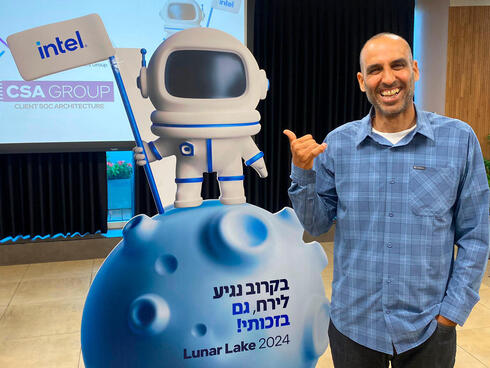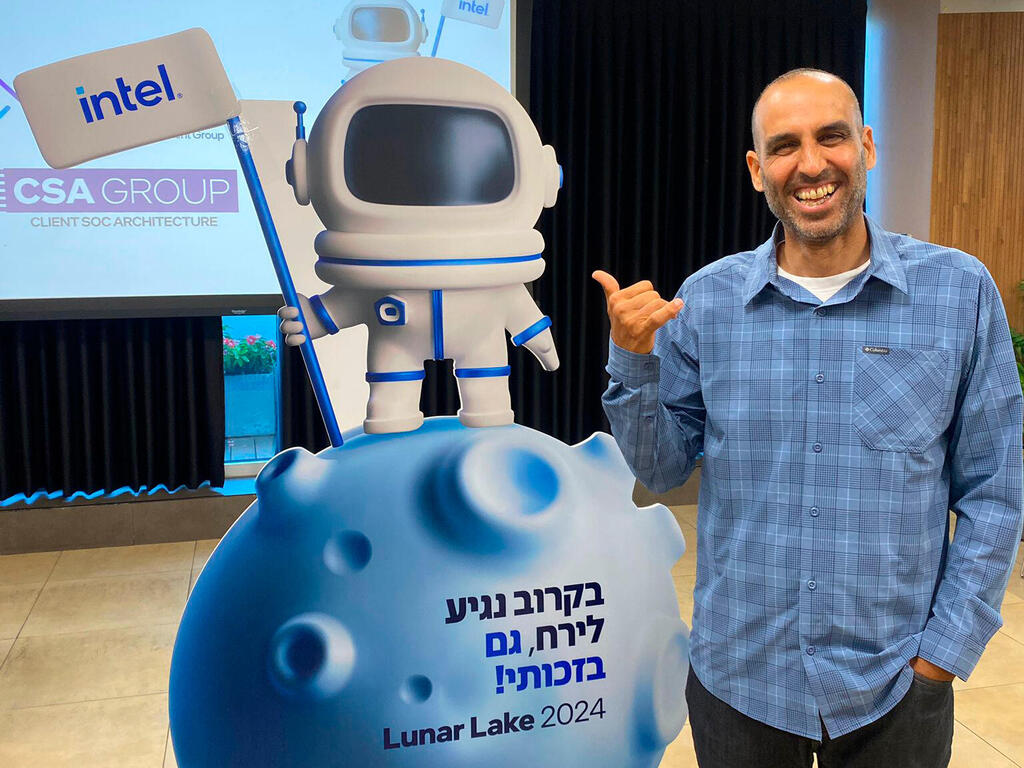
“The results speak for themselves. Israel will remain at the center of Intel's global efforts”
Zohar Tsaba, Vice President of the Client Computing Group at Intel and the head of its Lunar Lake program, has no doubt that the chip giant will continue to invest in its Israel center despite undergoing dramatic cutbacks. “There is depth and technological and professional expertise here that really doesn't exist anywhere else.”
The interview with Zohar Tsaba, Vice President of the Client Computing Group at Intel, was conducted via video call. Tsaba is the head of the Lunar Lake program, the new processors that Intel launched on Tuesday, but he did not attend the company's event in Berlin. After two minutes of the interview, the call was interrupted due to a low battery on the computer. When the connection was renewed, Tsaba looked satisfied: "This is an exceptional demonstration of one of the problems we solved with Lunar Lake. You can take your laptop and work all day—the battery lasts for 20 hours of video viewing, and it can support a Microsoft Teams conversation with 10 participants for 10 hours. The power consumption has decreased, and the performance has improved. These are things that were previously thought impossible."
1 View gallery


Zohar Tsaba, Vice President of the Client Computing Group at Intel.
(Photo: Barak Sharon)
There is plenty of talk about integrating AI into the PC, but it sounds very general, and it's not always clear what benefits it provides. After all, you can already edit and create photos, and there is real-time translation. What else can we expect from AI?
Tsaba: "I think we are on the brink of a major breakthrough in this field. We offer an extremely powerful machine as a foundation, and the possibilities for what developers and companies will achieve with it are limitless. Currently, we have 500 AI models. These models can encompass language, sound, images, vehicles—anything you can imagine, and developers can innovate extensively with them. It's hard to predict what they will create in the next month or six months. For example, imagine having a video call of this quality, used by countless people. This is the kind of future we're moving towards. You can easily remove details from images. The purpose of our conversation is not to make you redundant, but to free up your time. We could add real-time translation, so if I were speaking with someone from Japan, it would occur in the background without you needing to do anything."
Microsoft has announced the integration of AI into PCs, but it still requires a network connection for it to work. Will that change?
"It depends on the software and its uses. In many cases, it's hybrid—part of the processing is done on the computer, and part in the cloud. But there are also applications that run entirely on the computer, so you don't need an Internet connection."
What role did Israel play in the development of the new processor?
"This product is largely 'blue and white,' like all Intel products. It's never entirely from Israel or any one place; it's always a collaboration between different company sites and geographies. The Israeli footprint is very, very significant. The architecture was defined here, the concept was created here, and the technological lead came from here. I have managed this product from its first day until now. It is from Israel, so it definitely carries a lot of Israeli pride."
During the war, Intel CEO Pat Gelsinger said that the workers in Israel deliver results no matter the situation. How did you deal with the difficulties?
"This year was extremely challenging and demonstrated the strength of the people here at Intel Israel. There were people in the reserves, people who were evacuated from their homes, and despite this, there was a tremendous commitment to work. We delivered the product on time and with the highest possible quality—an amazing product. So first of all, credit goes to the employees. The second aspect is the management, which provided exceptional support, starting with our CEO, who gave support both in spirit and words, as well as in actions, grants, and overall management. I think Intel Israel showed its strength in a really impressive way, and the results speak for themselves."
And despite this success, is there a chance that one day Intel might decide they don't want a development center that's within missile range, under the threat of terrorist attacks, with flights being suddenly canceled?
"Intel Israel has almost always led the company's flagship products. These are technological revolutions that were led, designed, and developed by Intel Israel. No one will give that up. There is depth and technological and professional expertise here that really doesn't exist anywhere else. So the results speak for themselves. These days, we are starting work on the next processor, called Panther Lake. As long as we continue with this level of commitment and professionalism, I believe we will remain at the center of Intel's global efforts. Again, it's purely based on the results—there are no sentiments here beyond business, and the results we show are exceptional."













